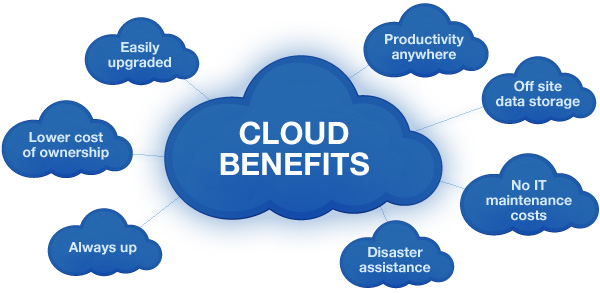Understanding the importance of cloud computing and Get benefits
One of the most significant advantages of cloud computing is its cost-efficiency. Traditional IT setups require substantial capital investment

In today's fast-paced cloud computing world, the rapid advancement of technology has brought about a paradigm shift in the way we conduct business and manage data. One of the most revolutionary developments in recent years is cloud computing.
In this blog post, we will explore the concept of cloud computing and delve into its numerous advantages.
Moreover, we will discuss how this cutting-edge technology has ushered in a technological revolution, transforming the way IT services operate in our modern digital landscape.
Understanding Cloud Computing
Cloud computing is a groundbreaking technology that allows individuals, businesses, and organizations to access and utilize computing resources and services over the internet. Instead of relying on traditional physical servers or local infrastructure, cloud computing enables users to store, process, and manage data remotely on servers hosted by third-party providers.
This technology has gained immense popularity due to its scalability, flexibility, and cost-efficiency. Cloud computing services are offered through various models, including Infrastructure as a Service (IaaS), Platform as a Service (PaaS), and Software as a Service (SaaS), each catering to specific needs and requirements.
Advantages
1. Cost Efficiency
One of the most significant advantages of cloud computing is its cost-efficiency. Traditional IT setups require substantial capital investments in hardware, software, and maintenance. In contrast, cloud services offer a pay-as-you-go model, allowing businesses to scale their resources as needed. This eliminates the need for large upfront investments and minimizes operational costs, making cloud computing an attractive option for businesses of all sizes.
2. Scalability
Scalability is a crucial aspect of modern business operations. Cloud computing provides the ability to scale resources up or down based on demand. Whether you're a startup experiencing rapid growth or an established enterprise adapting to changing market conditions, the cloud offers the flexibility to meet your evolving needs. This scalability ensures that your IT infrastructure can keep up with your business's requirements without significant disruptions.
3. Accessibility and Remote Collaboration
Cloud computing enables remote access to data and applications from anywhere with an internet connection. This accessibility fosters collaboration among teams, regardless of their physical locations. With cloud-based tools and services, employees can work together in real-time, enhancing productivity and efficiency. This feature proved to be invaluable during the COVID-19 pandemic when remote work became the norm.
4. Data Security and Disaster Recovery
Leading cloud service providers invest heavily in security measures to protect their clients' data. These companies employ advanced security protocols, encryption, and authentication mechanisms to safeguard information stored in the cloud. Additionally, cloud services offer robust disaster recovery solutions, ensuring data backup and redundancy in case of unforeseen events, such as natural disasters or cyberattacks.
5. Automatic Updates and Maintenance
Maintaining on-premises IT infrastructure can be time-consuming and resource-intensive. Cloud providers handle the necessary updates, maintenance, and security patches, freeing up IT teams to focus on more strategic tasks. This also ensures that businesses always have access to the latest technology and security features, helping them stay competitive.
6. Environmental Sustainability
Cloud computing can have a positive impact on the environment. Cloud data centers are often more energy-efficient than traditional on-premises data centers, thanks to their optimized infrastructure and resource allocation. By migrating to the cloud, businesses can reduce their carbon footprint and contribute to a greener future.
The Technological Revolution Enabled
Cloud computing has become the linchpin of the technological revolution we are witnessing today. It has catalyzed innovation and transformed the way IT services operate across industries. Here are some key ways in which cloud computing has revolutionized technology:
1. Agile Development and DevOps
Cloud computing has made it easier for development teams to adopt agile methodologies and implement DevOps practices. Developers can quickly provision resources, test applications, and deploy updates in the cloud environment. This agility accelerates the development cycle and allows for more frequent releases, keeping businesses competitive in rapidly evolving markets.
2. Big Data and Analytics
The vast amount of data generated in today's digital landscape requires powerful tools for analysis. Cloud computing provides the necessary infrastructure to store, process, and analyze big data efficiently. Businesses can leverage cloud-based analytics services to gain valuable insights, make data-driven decisions, and gain a competitive edge.
3. Internet of Things (IoT)
The IoT ecosystem relies heavily on cloud computing for data storage, processing, and real-time analysis. Cloud platforms offer the scalability and connectivity needed to manage the vast number of IoT devices and the data they generate. This has opened up new possibilities in industries such as healthcare, logistics, and smart cities.
4. Artificial Intelligence and Machine Learning
AI and machine learning algorithms require significant computational power and large datasets for training. Cloud providers offer specialized services and resources for AI and ML workloads, making it accessible to businesses without the need for extensive hardware investments. This democratization of AI technology has led to breakthroughs in various fields, from healthcare to finance.
5. Edge Technology and IoT
Edge computing, an extension of cloud computing, is gaining prominence as it enables data processing and analysis closer to the data source. This is especially important for IoT applications that require low latency and real-time responses. The combination of cloud and edge technology allows businesses to leverage the best of both worlds, ensuring efficient data processing and decision-making.
Viva Technology
The annual Viva Technology event showcases the latest innovations and cutting-edge technologies that are shaping the future. Cloud computing has been a central theme at Viva Technology, with leading cloud service providers and startups showcasing their solutions. These events provide a platform for businesses to explore how cloud technology can drive their digital transformation and remain competitive in the ever-evolving landscape.
In conclusion, cloud computing has emerged as a transformative force in the world of IT services and technology. Its numerous advantages, including cost efficiency, scalability, accessibility, data security, and environmental sustainability, have made it a cornerstone of modern business operations.
Moreover, cloud computing has fueled a technological revolution, enabling agile development, powering big data analytics, supporting IoT and cutting-edge technology, and democratizing AI and machine learning.
As we continue to witness rapid advancements in technology, businesses that embrace cloud computing are better positioned to thrive in the digital age. Events like Viva Technology serve as a testament to the pivotal role of cloud computing in shaping our future.
Whether you're a startup aiming for rapid growth or an established enterprise seeking to stay competitive, the cloud offers the tools and resources to drive innovation and success in this dynamic landscape. Embrace the power of cloud computing, and join the technological revolution that is reshaping the world of IT services.
What's Your Reaction?
















